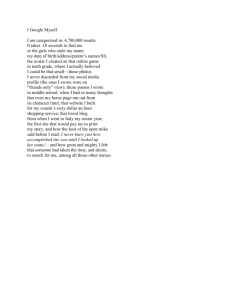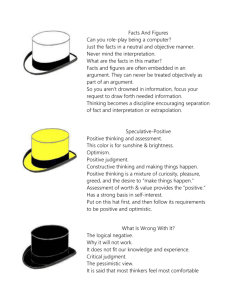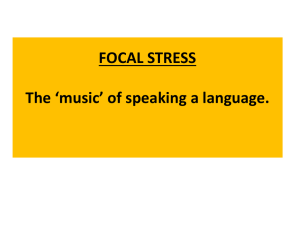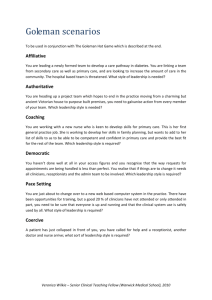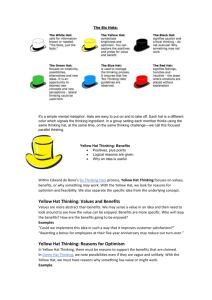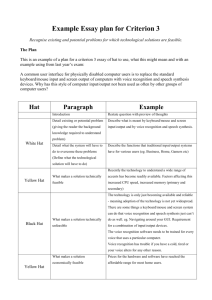Sentence stress
advertisement
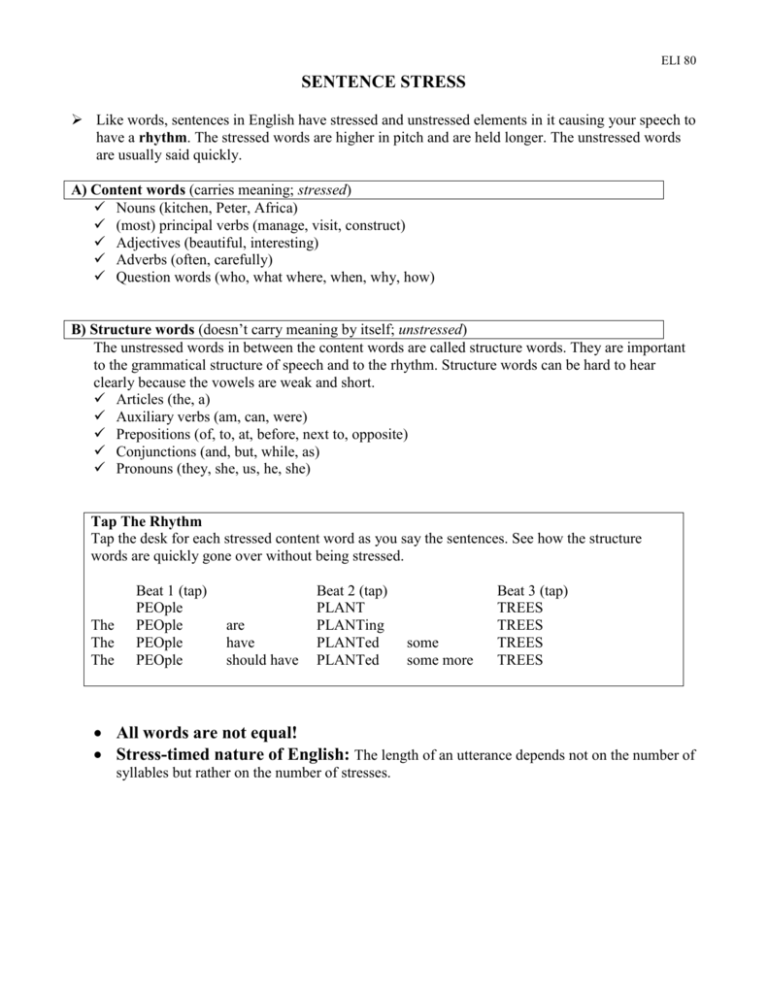
ELI 80 SENTENCE STRESS Like words, sentences in English have stressed and unstressed elements in it causing your speech to have a rhythm. The stressed words are higher in pitch and are held longer. The unstressed words are usually said quickly. A) Content words (carries meaning; stressed) Nouns (kitchen, Peter, Africa) (most) principal verbs (manage, visit, construct) Adjectives (beautiful, interesting) Adverbs (often, carefully) Question words (who, what where, when, why, how) B) Structure words (doesn’t carry meaning by itself; unstressed) The unstressed words in between the content words are called structure words. They are important to the grammatical structure of speech and to the rhythm. Structure words can be hard to hear clearly because the vowels are weak and short. Articles (the, a) Auxiliary verbs (am, can, were) Prepositions (of, to, at, before, next to, opposite) Conjunctions (and, but, while, as) Pronouns (they, she, us, he, she) Tap The Rhythm Tap the desk for each stressed content word as you say the sentences. See how the structure words are quickly gone over without being stressed. The The The Beat 1 (tap) PEOple PEOple PEOple PEOple are have should have Beat 2 (tap) PLANT PLANTing PLANTed PLANTed some some more Beat 3 (tap) TREES TREES TREES TREES All words are not equal! Stress-timed nature of English: The length of an utterance depends not on the number of syllables but rather on the number of stresses. ELI 80 C) Prominence (the most strongly stressed) It would be confusing if all the content words were stressed equally or were said at the same pitch. The prominence gets the strongest stress to call attention to what is most important. In a basic pattern, the prominence is usually the last content word in each thought group* or short sentence. We DROVE in the DARK. I SAT in the LAST ROW. I KNOW WHO her FATHER is. Some CREDit CARD COMpanies / OFFer LOW INterest / but they CHARGE an ANNual FEE. // She WANTS to beCOME an inTERpreter / and WORK for an international COMpany. // What is a Thought group? When we think about where a speaker can logically pause in the stream of speech, we can separate an utterance into thought groups. This unit of speech typically contains one prominent element. A single utterance of sentence may include several intonation units, each with its own prominence. There is no fool proof way of dividing an utterance into intonation units. In rapid speech, intonation units may be fairly long; in slower speech, they may be shorter, and breaks between units will therefore be more frequent. Public speakers tend to pause frequently to make their message clearer or more emphatic. By contrast, if in another context the speaker is communicating urgency, the intonation units may be longer and the speech may contain fewer breaks. In some cases the speakers stress words that would not normally receive strong stress and make it the focus word. The prominence 1)highlights new information or 2) contrasts information or 3) is used for emphasis in responding to previous statement or questions, and so cause the sentence to convey certain meanings. New Information X: I’ve lost an umBRELLa Y: A LAdy’s umbrella? (new) X: Yes. A lady’s umbrella with STARS on it. GREEN stars. (new) Emphatic Stress A: How do you like that NEW comPUter you BOUGHT? B: I’m REALly enjoying it! (emphatic) Contrastive Stress A: Is this the LOW IMpact aeRObics CLASS? B: No it’s the HIGH impact class. (contrastive) ELI 80 Practice 1: Awareness Raising Discourse context What about John? Who can’t go? Why doesn’t John go? Prominent Stress He CAN’T GO He CAN’T GO He CAN’T GO. 1. I’m LIStening 2. I’M LISTening. 3. I AM LISTENing. Practice 2: Disagreement See how prominence is stressed the strongest in order to show new or contrastive information. Practice these dialogues with your partner. Take turns saying the first remark. Emphasize the underlined word. 1. A: Dallas is in California B: That’s not right. It’s in Texas 2. A: I buy books at the library B: No, you buy books at the bookstore. 3. A: I buy books at the library B: No you borrow books at the library. 4. A: A ship is smaller than a boat B: I don’t think so. A ship is bigger than a boat. 5. A: You got home late. B: Not very late. 6. A: You’re always losing things! B: Not always. 7. A: Florence is that capital of Italy. B: No, Rome is. 8. A: “Actual” means “in the present time” B: No, “actual” means “real” Practice 3 Listen to the two dialogs. Where would you place the prominence? Dialog 1 A: John looks depressed these days. B: What’s his problem? Dialog 2 A: Sara can’t come to the meeting tomorrow. She has a different meeting. B: John can’t make it either. A: What’s his problem? ELI 80 Practice 4: Dialogue practice The thought groups are marked with / and the prominence is underlined. Read the dialogue following with the pauses and prominent patterns that you have. A: I’m starving. / Let’s go grab a bite to eat. B: Good idea! / Where do you want to go? A: Well. / There’s an nice Italian restaurant / about a block from here. B: Do you have your heart set on Italian? / What about a Chinese place? A: Oh, / do you know one? B: I sure do. / The food is delicious / and it’s right around the corner. A: Great! / Let’s go! Practice 5: Predict and Practice 1. Mark the thought groups and prominence with your partner. 2. Practice what you have with the right sentence stress. (Maggie, Sara, Jennifer and Alice are college roommates. Maggie arrives home to find Sara cleaning the bathroom – not one of their favorite duties.) Maggie: Hi, Sara. What’s up? Sara: I’m cleaning the bathroom. Maggie: You’re cleaning the bathroom? Wasn’t Jennifer supposed to clean it this week? Sara: She was, but she can’t Maggie: Why not? Sara: She has a mid-term tomorrow. So she asked Alice and she couldn’t either. Maggie: What’s her problem? Sara: Her parents are here from out of town. Practice 6: Create your own! With your partner, create a short dialog using a sentence: “I am tired today.” 1. Prominence on “I” 2. Prominence on “am” 3. Prominence on “tired” 4. Prominence on “today” ELI 80 Extra Practice Same sentence, different prominence, different context! I did not SAY you STOLE my RED HAT. (But somebody else did.) I did NOT SAY you STOLE my RED HAT. (Strong anger and denial of the fact.) I did not SAY you STOLE my RED HAT. (I just thought you did) I did not SAY YOU STOLE my RED HAT. (I said Jason stole my red hat) I did not SAY you STOLE my RED HAT. (I said that you borrowed it) I did not SAY you STOLE MY RED HAT. (I said that you stole Jane’s hat) I did not SAY you STOLE my RED HAT. (I said that you stole my green one) ① I did not SAY you STOLE my RED HAT. (But somebody else did.) - Contrastive Example Dialogue A: It’s you that told everyone I stole your red hat, right? B: I did not say you stole my red hat. It’s Ben! ② I did NOT SAY you STOLE my RED HAT. (Strong denial of the fact.) - Emphatic Example Dialogue A: How could you say that I stole your red hat in front of everyone! B: I did NOT say you stole my red hat! You’ve got to trust me! ③ I did not SAY you STOLE my RED HAT. (I just thought you did) - Contrastive Example Dialogue A: You think I really stole your red hat? B: Well, I did not SAY you stole my red hat. I just thought maybe you did. ④ I did not SAY YOU STOLE my RED HAT. (I said Jason stole my red hat) - Contrastive Example Dialogue A: Did you doubt me for stealing your red hat? B: I did not say YOU stole my red hat. I was thinking of Jason. ⑤ I did not SAY you STOLE my RED HAT. (I said that you borrowed it) - Contrastive Example Dialogue A: Where is my red hat? B: I’m wearing it. I borrowed it from you yesterday. Really, you let me borrow it! A: Yes, I remember. Calm down! I did not say you STOLE my red hat. ⑥ I did not SAY you STOLE MY RED HAT. (I said that you stole Jane’s hat) - Contrastive Example Dialogue A Let's see. I've returned all the red hats I stole on Christmas Day, but I can't seem to find yours. B: I did not say that you stole MY red hat. ⑦ I did not SAY you STOLE my RED HAT. (I said that you stole my green one) - Contrastive Example Dialogue A: Did you take my hat? B: No! I didn’t steal your red hat! A: I did not say you stole my RED hat. I was talking about the green one.
